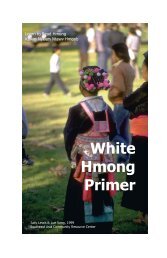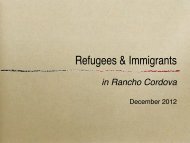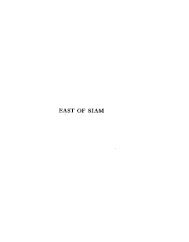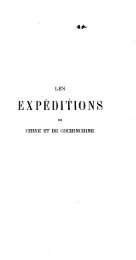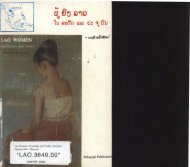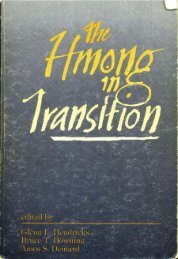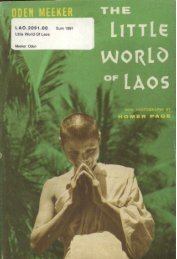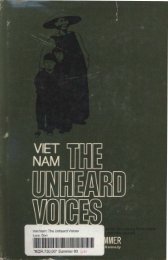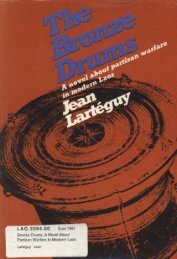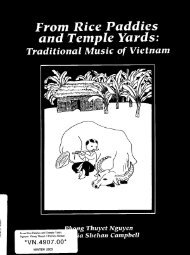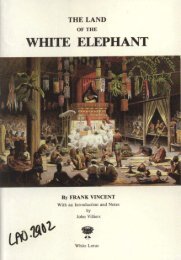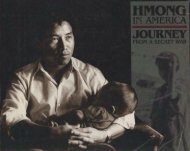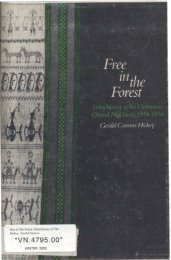PEOPLE
Grant, The Boat People - Refugee Educators' Network
Grant, The Boat People - Refugee Educators' Network
- No tags were found...
Create successful ePaper yourself
Turn your PDF publications into a flip-book with our unique Google optimized e-Paper software.
The Boat People<br />
against Ho Chi Minh. No figure of national reputation was now<br />
offering. And in three weeks I'rcsident Kennedy was assassin~ted<br />
at Dallas, Tcxas.<br />
The war now became America's war. President Johnson committed<br />
ground trwps and Hanoi moved larger tactical units into the<br />
south. American bombers pounded the north, American aliies {Australia,<br />
New Zmlmnd, South Korea, Philippines and Thailand) gave<br />
military suppon. Evenrually 500 000 American maps would be in<br />
Vietnam and the hmbing would exceed three times all the tonnage.<br />
droppcd on Germany, Imly and Japnn during the second world war,<br />
This huge effort had a single aim: to secure the independence of the.<br />
republic of Vietnam in the south (or, put in historical terms, to keep<br />
Victnam divided). Ho Chi Minh also had a single aim: to unite Vitt-,<br />
nam under his le~dership.<br />
There was no prospect that Vietnam would bc united under the<br />
Leadership of the south, Whilc cunuovcrsy over the war raged in<br />
America and he world, President Johnson claimed that the policy<br />
of attrition was working and that 70 pcr cent of the south was fat<br />
of communist control. But the fall of Diem had produced a succession<br />
of ineffective governments, until a formcr general, Nguyen<br />
Van Thitu, became prcsidcnt by election in 1967. The Vietcong<br />
struck a devastating blow during the Tct {lunar new year) holiday<br />
on 1 February 1968, launching a general offensive on cities and<br />
towns, including Saigon and Hue, and on military installations<br />
throughout the south. They were repulsed over a perid of two or<br />
three wecks and suffered hervy casualties, but not before thcy had<br />
reduced many towns to ruins, killed thousands of civilians and demonstrated<br />
beyond doubt to thc population that the sourh was not safe.<br />
President Johnson announced thar he intended to stand down.<br />
The year 1969 marked another stage in the war. Richacd Nixun<br />
and Henry Kissinger came to power in Washington, Ho Chi Minh<br />
dicd and the struggle moved into the sphere of wmet diplomacy, and<br />
indccd, sccret war. Negotintions began openly in Paris but the real<br />
discussions werc conducted secre:ly ktwcen Kisvinger and Hanoi.<br />
An unannounced decision wa:i taken in Washington tu bomb Camhodia,<br />
and its head of statc, Princc Sihanouk, was replaced in R pro-<br />
American coup,<br />
There was great irony, and cvcn greater tragedy, in Wrruhine;ton'~<br />
dcvtruaion of Sihanouk, especially under a aecmry of staie who<br />
had become noted for his understanding of history (but evidently<br />
only of European history). For Sihanouk had wriucn in 1963:<br />
'Whether he is called Gia Long, Ho Chi Minh or Ngo Dinh Diem<br />
no Annarnite (or Vietnamese) will sleep peacefully until he has succceded<br />
in pushing Cambodia towards annihilation, having made it<br />
first go thruugh the stmga of slavery: Sihanouk did not want a<br />
powerful reunified Vietnam. He wanted a neutral South Vietnam<br />
and a neutral Laos sa that he would not have to share a border with<br />
communist North Vietnam which he saw as the strong one of the<br />
Indo-Chinese states. He also mid in 19M 'If wr region must one<br />
day be submerged by communism, we would wish drat it be China<br />
and not another socialist country which takes control of our country<br />
because we know that she understands us and thpt she will maintain<br />
. . . uur territorial integrity', The complex balance which Sihanwk<br />
sought was rejected as too subtle or too devious by Washington, just<br />
as it hd earlier rejected other Asian ideas such as Nehru's in its<br />
determination to establish American power and American ideas in<br />
Asia,<br />
American and South Vietnamese troops carried out operations in<br />
hand CamMia designed to cut 'the Ho Chi Minh trail' (actually<br />
a series oftrails) by which supplies and troops had been moving from<br />
north to south through neutral territory. Kissinger also undertook<br />
sccrct diplomacy with China, which Nixon visited in 1972, With<br />
each side trying to negoti~te from strength, the war went on. In 1'672<br />
Hanoi launch4 a military offensive over the border and the United<br />
States resporlded by resuming bombing for the first time since 1968.<br />
Yet de~pitc publicly expressed reuulve, the impression gained<br />
ground that the United Stater;, or at least Nixon and Kissinger,<br />
wanted an agreement with Hanui hcforc the 1972 presidential elcctions.<br />
Agreement was reached in Rris a few days bcfore polling day<br />
and Prcsidcnt Nixon was returned with a mawive majority.<br />
'he Paris accords brought clearly to the surface that, to uu Kiusinger's<br />
phrase, the Vietnam war had beuornc a 'cruel sideshow' tu<br />
he largcr nbiectivcs af American foreign pnlicy. 'Ihc essetlcc of the<br />
accords was a 'ceascfirc in place' which effectively meant that the<br />
forces of the NLF could remain in the bouth while rhc Americans,<br />
who wcrr withdrawing anyway for thcir own reasons, handed over




